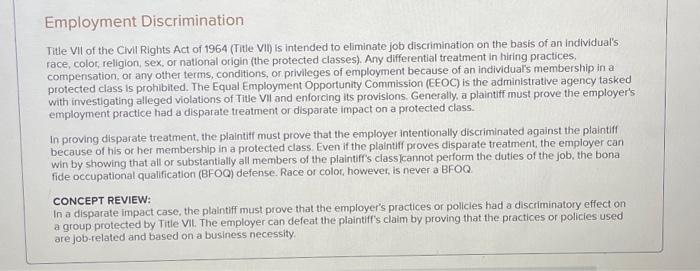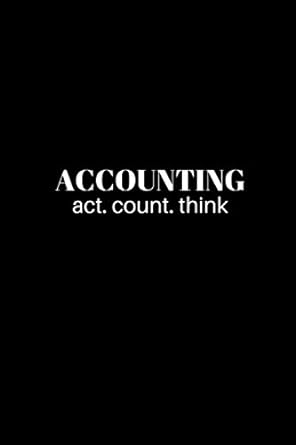Answered step by step
Verified Expert Solution
Question
1 Approved Answer
Employment Discrimination Title VII of the Civil Rights Act of 1964 (Title VII) is intended to eliminate job discrimination on the basis of an individual's
Employment Discrimination Title VII of the Civil Rights Act of 1964 (Title VII) is intended to eliminate job discrimination on the basis of an individual's race, color, religion, sex, or national origin (the protected classes). Any differential treatment in hiring practices, compensation, or any other terms, conditions, or privileges of employment because of an individual's membership in a protected class is prohibited. The Equal Employment Opportunity Commission (EEOC) is the administrative agency tasked with investigating alleged violations of Title VII and enforcing its provisions. Generally, a plaintiff must prove the employer's employment practice had a disparate treatment or disparate impact on a protected class. In proving disparate treatment, the plaintiff must prove that the employer intentionally discriminated against the plaintiff because of his or her membership in a protected class. Even if the plaintiff proves disparate treatment, the employer can win by showing that all or substantially all members of the plaintiff's class]cannot perform the duties of the job, the bona fide occupational qualification (BFOQ) defense. Race or color, however, is never a BFOQ. CONCEPT REVIEW: In a disparate impact case, the plaintiff must prove that the employer's practices or policies had a discriminatory effect on a group protected by Title VII. The employer can defeat the plaintiff's claim by proving that the practices or policies used are job-related and based on a business necessity.

Step by Step Solution
There are 3 Steps involved in it
Step: 1

Get Instant Access to Expert-Tailored Solutions
See step-by-step solutions with expert insights and AI powered tools for academic success
Step: 2

Step: 3

Ace Your Homework with AI
Get the answers you need in no time with our AI-driven, step-by-step assistance
Get Started


